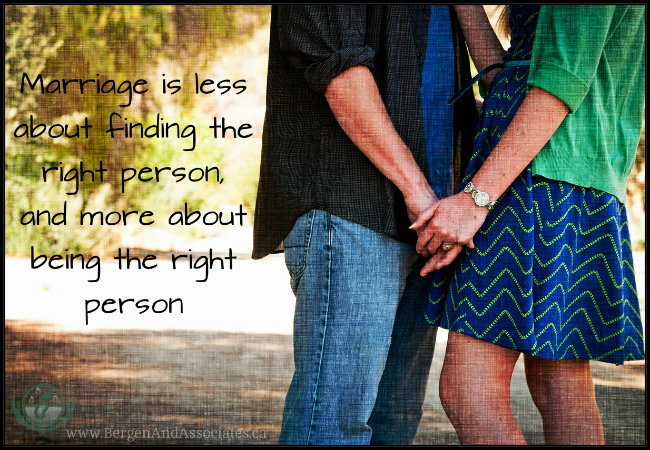Marriage is not about finding the right person. It’s about becoming the right person.
Elliot Katz, A divorced man whose done some thinking
Psychology Today has a great article on marriage which I devoured the other day. It’s a fabulous piece that will likely be hard to read for those spouses who want to fix their relationship by having their partner fixed.

I can’t resist quoting a few gems from the article…which I would encourage all marrrieds or might-someday-be-married folks to read. This is a thought provoking gem:
Sooner or later, there comes a moment in all relationships when you lie in bed, roll over, look at the person next to you and think it’s all a dreadful mistake…I call it the first day of your real marriage….It’s not a sign that you’ve chosen the wrong partner. It is the signal to grow as an individual—to take responsibility for your own frustrations. Invariably, we yearn for perfection but are stuck with an imperfect human being. We all fall in love with people we think will deliver us from life’s wounds but who wind up knowing how to rub against us.In mature love… “we do not look to our partner to provide our happiness, and we don’t blame them for our unhappiness. We take responsibility for the expectations that we carry, for our own negative emotional reactions, for our own insecurities, and for our own dark moods.”Disillusionment becomes an engine for growth because it forces us to discover our needs. Knowing oneself, recognizing one’s needs, and speaking up for them in a relationship are often acts of bravery, says Page. Most of us are guarded about our needs, because they are typically our areas of greatest sensitivity and vulnerability….At the same time, taking the risk to expose your inner life to your partner turns out to be the great opportunity for expanding intimacy and a sense of connection. This is the great power of relationships…
The only elements that identified those who eventually divorced were negative and self-protective reactions during discussions of relationship difficulties and nonsupportive reactions in discussing a personal issue. Displays of anger, contempt, or attempts to blame or invalidate a partner augured poorly, even when the partners felt their marriage was functioning well overall….In other words, the inability or unwillingness to suppress negative emotions in the heat of the moment eliminates the possibility of a transformation of motivation to a broader perspective than one’s own. Eventually, the cumulative impact of negative reactivity brings the relationship down.“We’re all difficult. Everyone who is married is a difficult spouse. We emphasize that our spouse is difficult and forget how we’re difficult for them.”(bolded emphases mine)
I get that there can be more to the situation that this. You are not responsible for your partner’s behaviour. However, you can make a choice about how to respond to that behaviour. If he calls you names, or she throws something at you that is hard and painful and difficult…most folks want to react by curling into a ball, or throwing something bigger and better back…neither of which is ultimately helpful. It’s hard, and may take some support…but you can make careful and deliberate choices so that your needs are clear and non-negotiable, even as you are respectful of the other’s needs.
So…try this. Next time you are disgruntled about your relationship, deliberately make a choice to examine your role in the dynamic and determine what impact you have on your spouse that helps to create their reaction.
One book that I find amazingly helpful for folks who almost forget what it is like to speak in a way that invites constructive dialogue with their spouse is the book, Talk to Me like I’m Someone You Love. It’s a great spiral bound book with “flashcards” along with explanations about how/when to use them. A few examples:
- Taking responsibility: “I realize I’m overreacting. Can you give me a minute to get sane again?”
- Apologizing: “I know I’ve really hurt you. What can I do to help you trust me again?”
- Loving: “You are precious, and I get that I haven’t been treating you like you are.”
Can you imagine what sorts of responses those invite?






Write a Comment